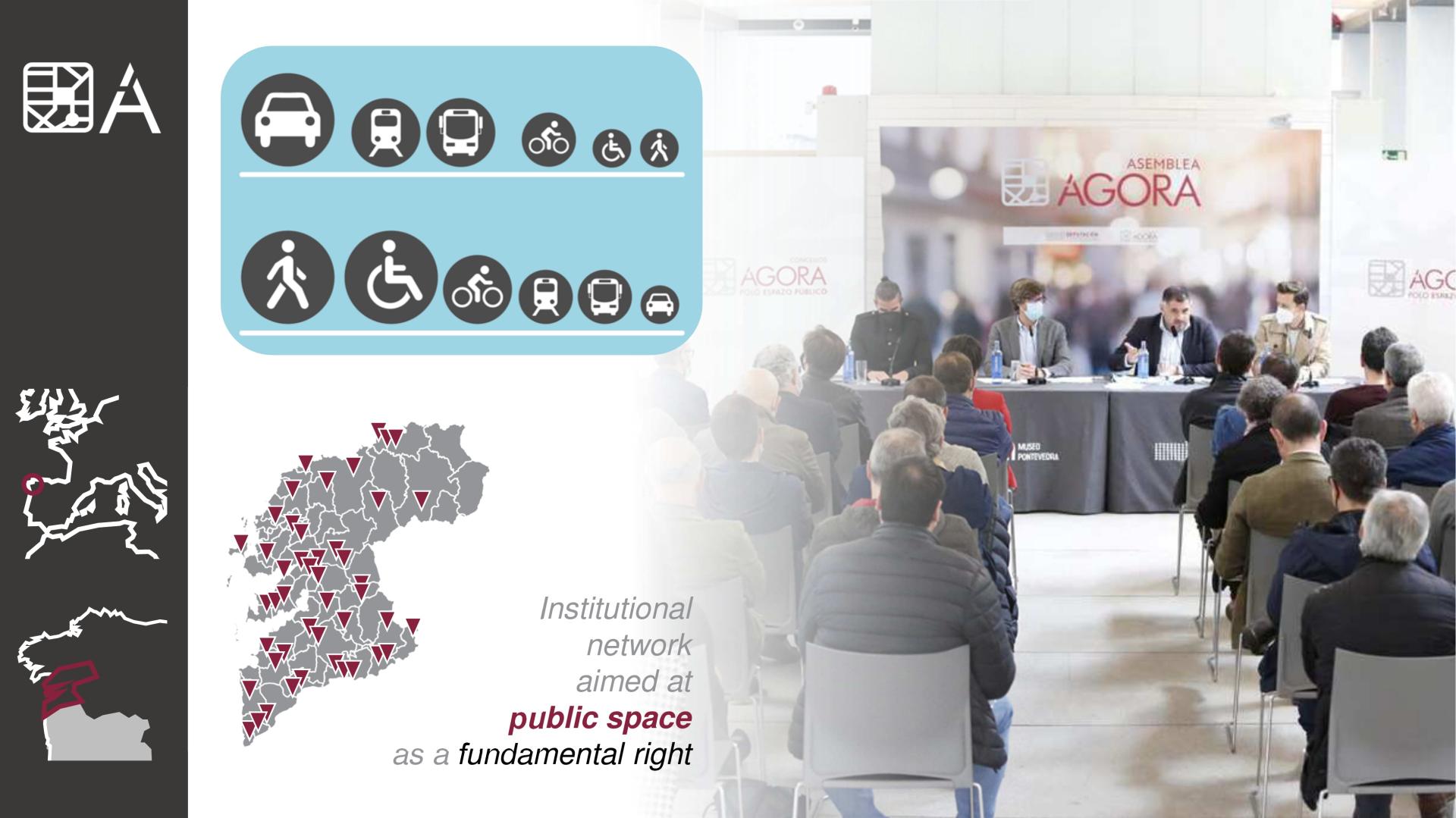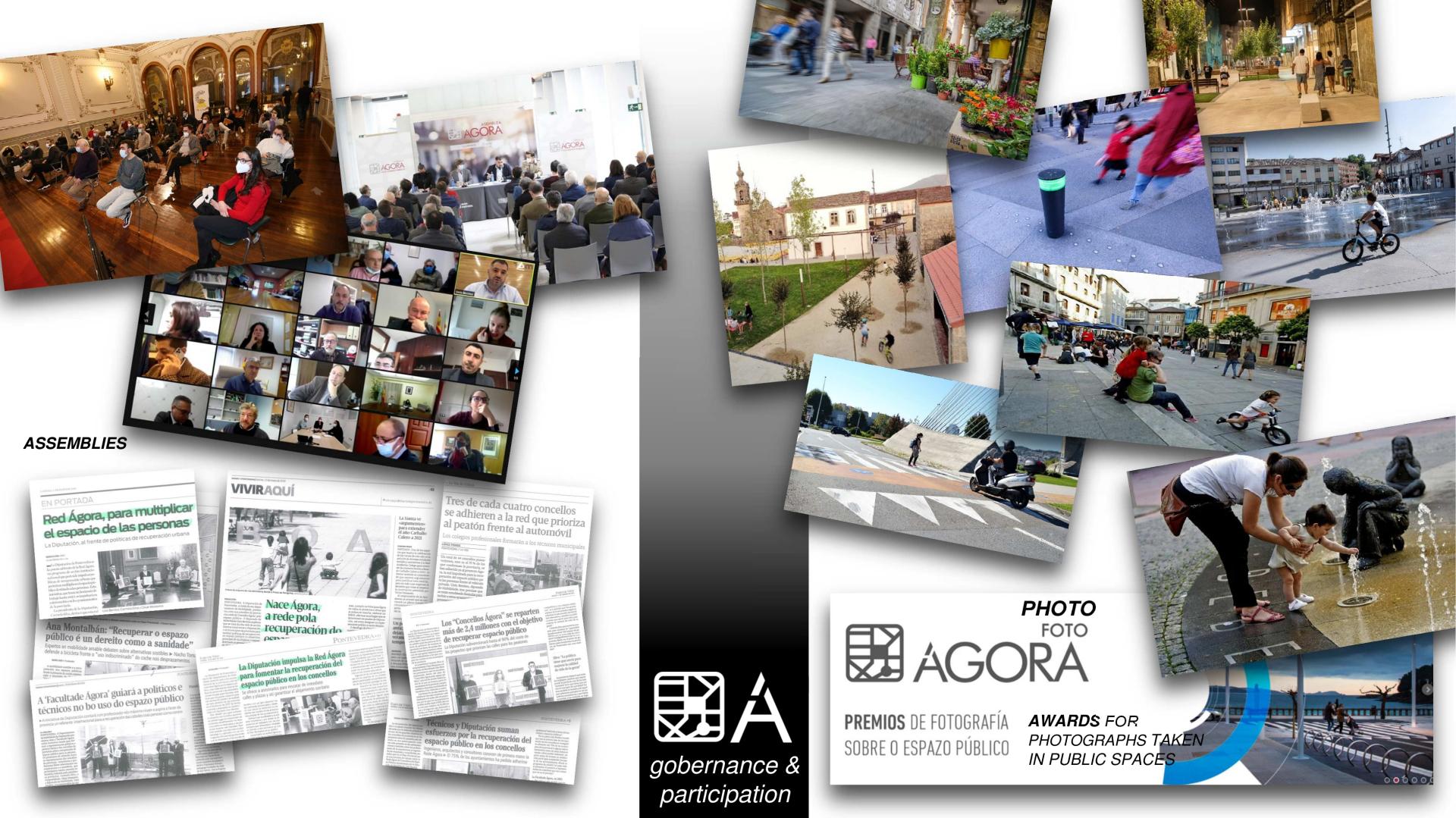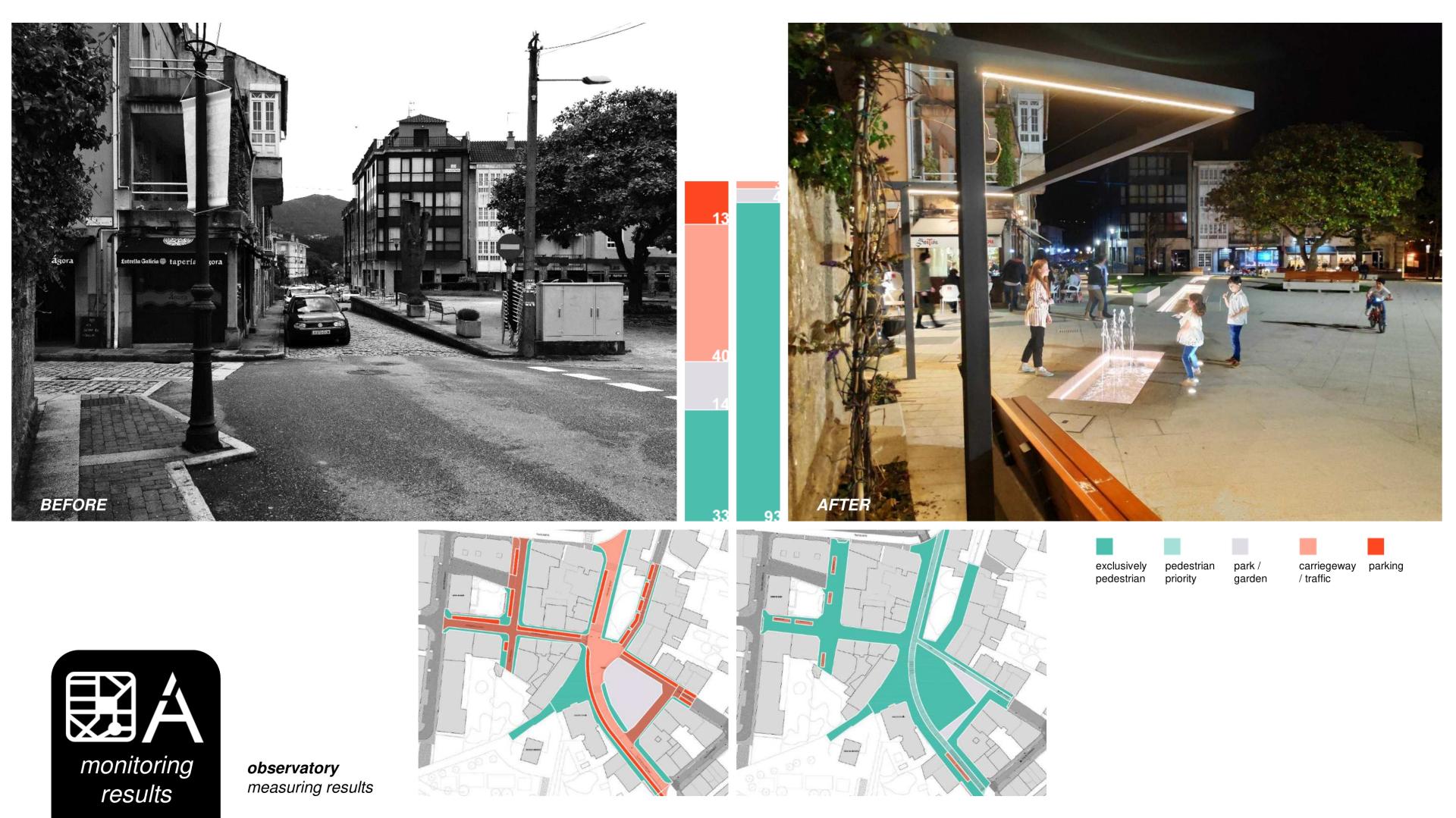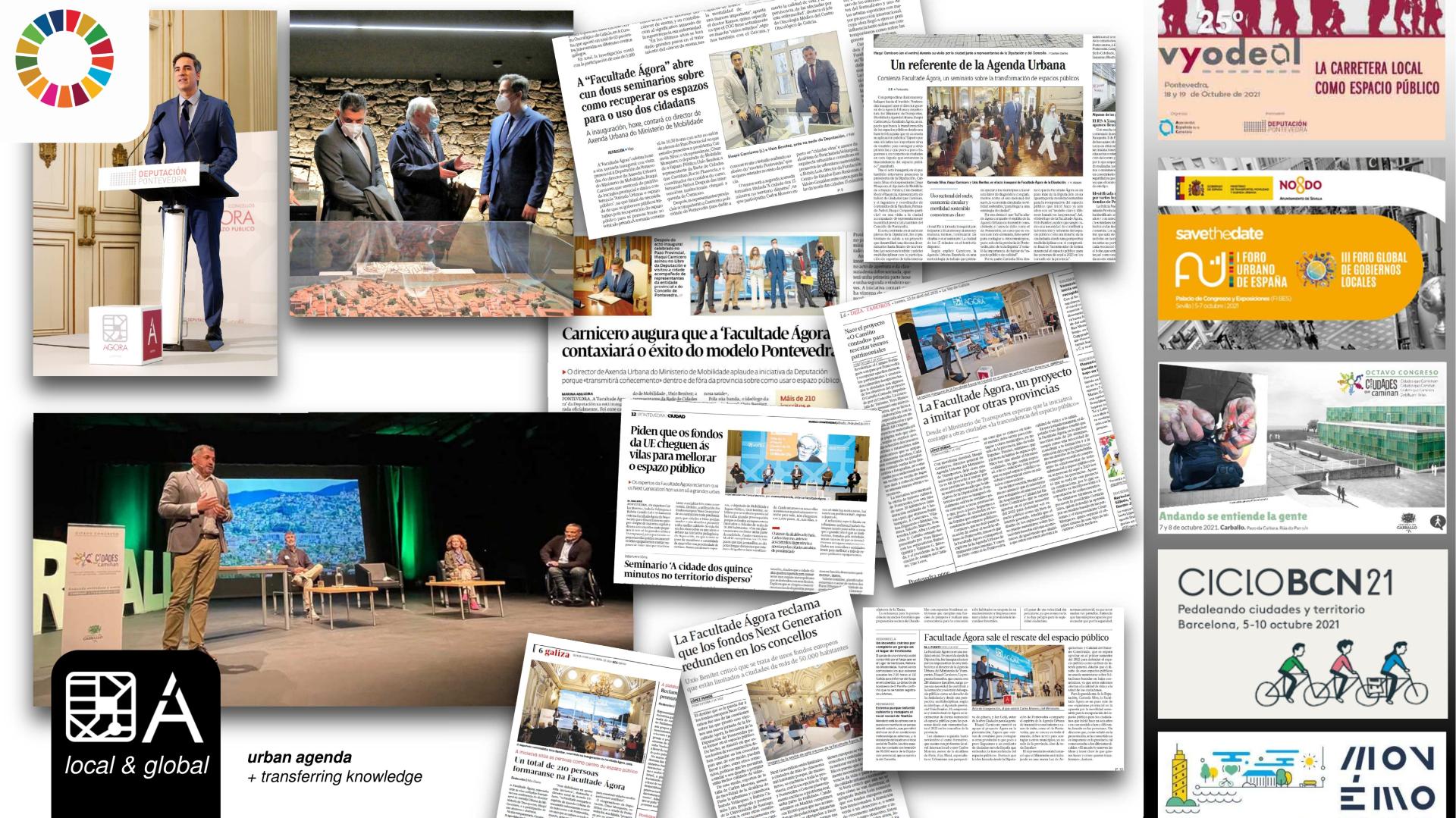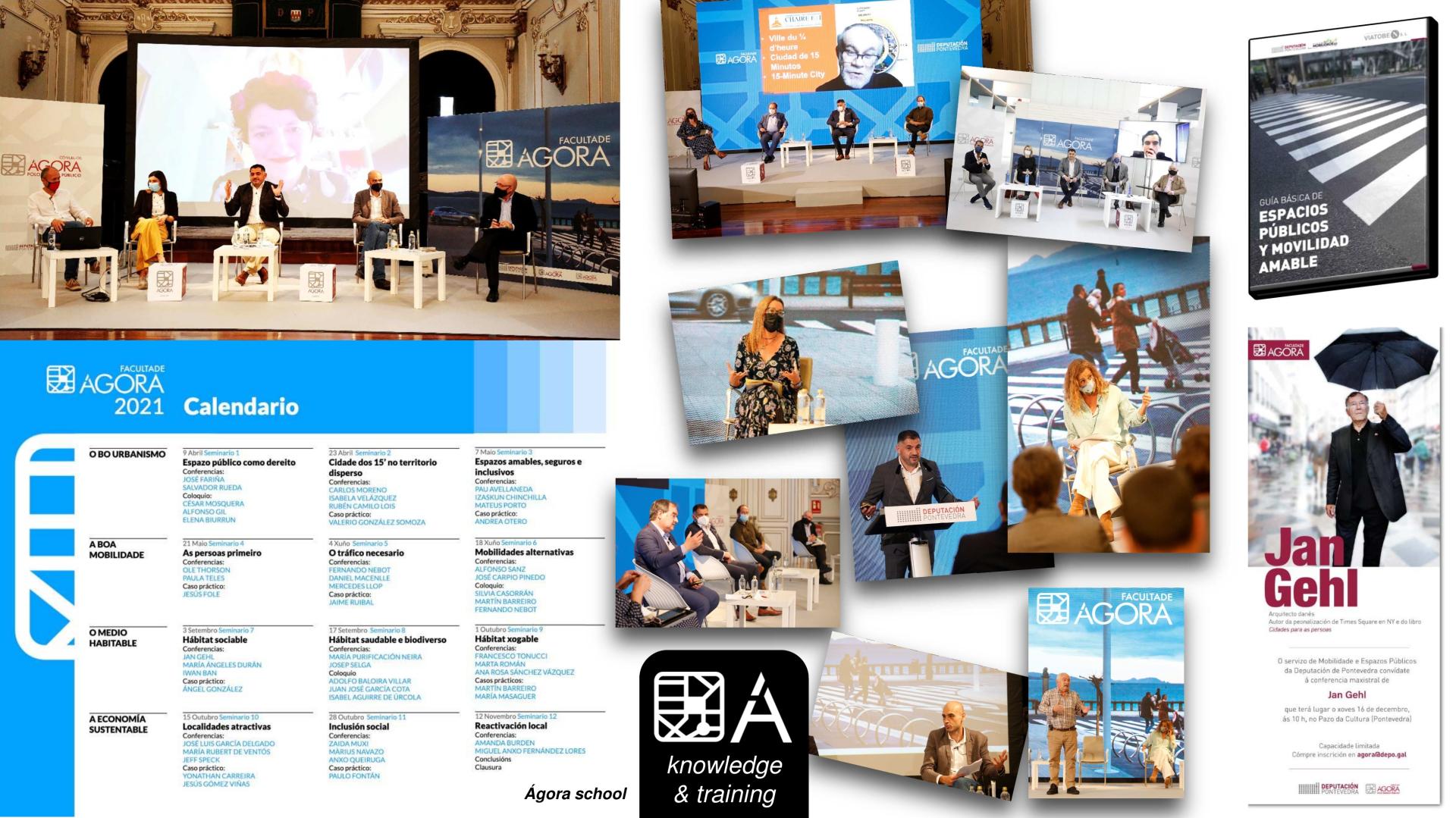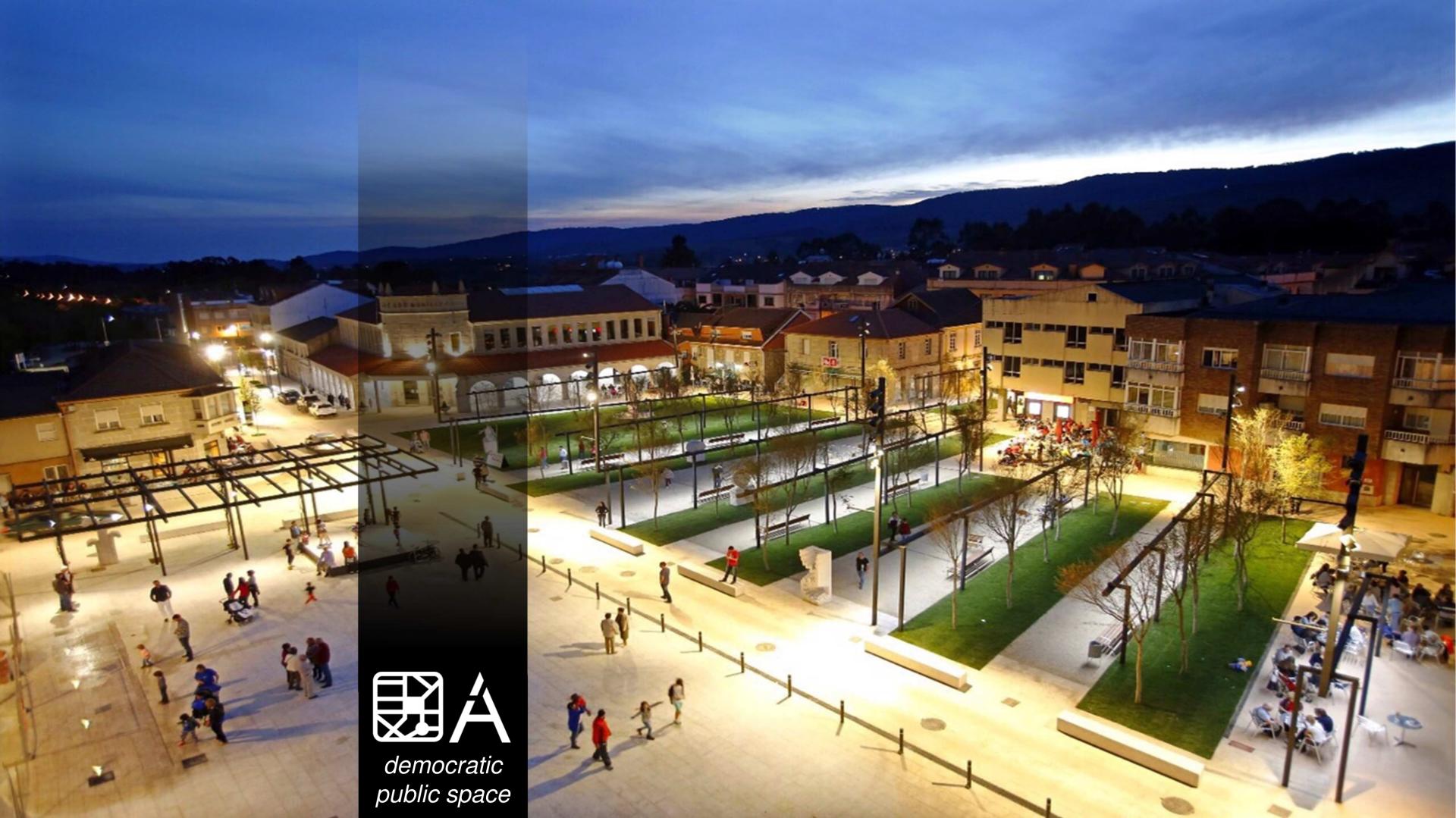ÁGORA NETWORK for PUBLIC SPACES
Basic information
Project Title
Full project title
Category
Project Description
Ágora is an institutional cooperation network of local councils, promoted and coordinated by the Provincial Council of Pontevedra (Deputación de Pontevedra), aimed at claiming public space as a fundamental right of citizenship, where people are a priority.
The local councils that are members of this network are committed to implementing policies to regain their public spaces for people promoting active mobility, by following the 10 principles established by the Ágora Network.
Geographical Scope
Project Region
Urban or rural issues
Physical or other transformations
EU Programme or fund
Which funds
Description of the project
Summary
In the last years, the Deputación de Pontevedra has been a benchmark for public administrations in Spain in regaining public space for people.
The Ágora Network strengthens and redefines the existing collaboration between the Deputación de Pontevedra and its local councils, creating a permanent working structure, on this part, the Ágora School becomes a place for exchanging and generating knowledge about public spaces
Currently, 54 municipalities are members of Ágora (>88% of the total number)
Thus, for almost two years now, this network has provided local councils with several permanent services that have supported decision-making throughout all stages involved in the transformation of public spaces
Its objective is that before 2023 the Ágora local councils substantially increase the public space intended for people and create walkable and cyclable paths. Moreover, these councils are committed to:
- Being represented in this network by a technician and a politician
- Developing a sustainable mobility plan (9 out of 10 them have already drafted one)
- Complying with the Ágora principles:
- Public spaces as a right
- People first
- Inclusive mobility
- Children’s autonomy
- Alternative mobility
- Safe spaces
- Healthy environment
- Friendly and high-quality spaces
- Local economic activities
- Alternative mobility
The local councils that are members of Ágora have already included the services provided by Ágora in their work dynamics:
>210 people attended the Ágora School (both technicians and politicians)
They have received more than 30 grants for drafting projects aimed at regaining public space
>200 consultancy services
3 guides and manuals were specifically designed and adapted to our geographical area
12 grants for creating safe school routes
They have attended 15 forums and congresses
They have applied for European funding and other financial sources
Ágora has an observatory which provides quantitative indicators and focuses on decision-making.
Key objectives for sustainability
The Ágora Network will be committed to reducing the use of motor vehicles, so as to build high quality-public spaces, free from environmental pollution. Moreover, it will be aimed at reducing energy in transport and greenhouse gas emissions.
There are countless design elements aimed at increasing the use of public spaces and reducing the use of cars: creation of green areas, implementation of traffic calming measures, creation of safe school routes and friendly spaces or development of inclusive design measures (some examples are leisure and recreation areas), among others. In this sense, Ágora provides support to improve the quality of projects aimed at transforming public spaces.
Ágora also promotes the use of bicycles in everyday mobility as an alternative form of transport. More than 50% of car journeys are less than 5 km long; therefore, the Ágora Network encourages the use of bicycles by improving road infrastructures, applying traffic calming measures, raising awareness among citizens, introducing bike registers and organising relearning courses.
Two major objectives for the sustainable transformation of our territory are based on combining high-quality public spaces and suitable infrastructures to promote active mobility. Agora’s concept of sustainability comprises economic aspects, such as the promotion of economic activities in neighbourhoods by creating pedestrian route networks, areas restricted to traffic and infrastructures for active mobility, so as to improve access to these shopping areas by active means within a 15-20-minute radius from our homes.
Key objectives for aesthetics and quality
Aesthetics have an effect on sensations; a simple joint in a pavement can create an undesirable hierarchy between users; it can also induce drivers to slow down or to intuitively give priority to pedestrians.
Thus, particular attention should be given to materials, finishes, furniture and plants, which are crucial when designing the aesthetics of public spaces; depending on the way these elements are combined, the space can be integrated in or separated from its surroundings.
The size of the elements, including vertical road traffic sings, litter bins or the bars of a railing, define the dimension of the space we want to achieve. With the aim to improve and increase the knowledge of both technicians and decision-makers in this subject, the first Ágora School was organised, where, among many other topics, the aesthetic dimension was included.
Ágora has trained the technicians who provide advice to local authorities whenever required. The Deputación de Pontevedra is committed to accomplishing high-quality detailed projects.
The local councils belonging to Ágora carry out a large number of projects, many of them having very low budgets and intended for temporary transformations, as long as no redevelopment/repaving work is carried out. The network tries to ensure that even small actions, such as painting the horizontal signage, are done with care, since it is precisely in the minor details where only "calligraphy" can show users that this space conveys care, attention to detail and that it is not in an improvised space where something unforeseen could happen to it.
Ágora has published a guide for action in public spaces and is currently developing new manuals. Moreover, the second edition of the Ágora school is being organised.
Key objectives for inclusion
Ágora encourages the transformation of public spaces to create large traffic-free zones, networks of pedestrian paths and bicycle lanes with an inclusive design. The local councils that are members of the network are carrying out this type of projects. This has allowed us to affirm that the Ágora Network is having a positive impact on the transformation of the spaces where people carry out their daily activities:
-Many more citizens are using them
-Physical and cognitive accessibility has been achieved
-Gender urban planning criteria have been applied...
Thanks to Ágora, the inhabitants of villages, towns and cities in the province can carry out their daily activities without having to commute outside their neighbourhoods and without needing a car.
All of this is socially equitable, because pedestrian-friendly, high-quality urban spaces give more autonomy to the most vulnerable groups of people, such as children or the elderly, who otherwise would be forced to stay at home. It is clear that a safe and comfortable environment, in a cohesive neighbourhood, reduces caregiving needs. Public space should serve as a catalyst for this.
It has been an informative, educational and participative process, in which all citizens have been informed and trained, and have participated jointly in the drafting of all projects through their local councils and their political representatives. In the first stage, these projects are shared with all local agents and citizens so that they can learn about the different proposals and projects that will be carried out in their own towns, so that they can actively participate in their development.
As said before, this project is aimed at training both technicians and politicians from local councils. Ágora is aimed at regaining public space for people not only as an end in itself, but also as a means to build community-based towns, plenty of local businesses and bustling streets.
Results in relation to category
Ágora has successfully guided the actions of many of the local councils that are members of the network. Now, their actions are focused on inclusion in terms of public space and mobility, giving priority to the people and the places that need it most.
By undertaking the commitments of the Ágora Network, a new framework has been achieved. Thanks to it, public actions are considering the most vulnerable citizens and groups of people (the traditional approach was to seek more spaces reserved for cars as well as parking spaces).
The Ágora Network offers training, representation, advice and funds to the smallest municipalities in the province, which are precisely those with the highest rate of car use and the fewest square meters intended for friendly public spaces, so these are the places that are most in need.
As regards quality processes, Ágora has three active lines of action:
- A " pilot" line, implemented in one or two local councils, including new actions (before turning them into a subsidy line). This was done with safe school routes, mobility plans, etc.
- Another line "in progress", which consists of drawing conclusions from the pilot lines, devising subsidy lines and supervising their implementation.
- The third line, “training”, implies transferring and exchanging knowledge (providing advice and participating in training and knowledge exchange activities).
The Ágora Observatory has recorded more than 140,000m² of public pedestrian space, which represents an increase of 7%. About 5% more children go to school using active mobility, and an increase in bicycle use has been reported.
How Citizens benefit
This project is aimed at training both technical and political staff from the local councils. It is an informative, educational and participative process, in which all citizens are informed and trained, and participate jointly in the drafting of all projects through their local councils and their political representatives.
Ágora’s objective is achieving sustainability, fighting against road violence, regaining public space for people, promoting local economic activities... Most local councils share this aim, but sometimes they do not have the means to carry them out. Thus, the Ágora Network was created in order to help them achieve these goals and lead the way. This is why the lines of action have been designed considering the interests and needs of local councils.
Subsidies for the drafting of plans and projects for the execution of works do not significantly increase the workload of local councils; on the contrary, it is often reduced. Ágora analyses the needs of the local councils and tries to ease their pending tasks by:
- Helping them to tender for (and finance) sustainable urban mobility plans
- Calling for subsidies to contract out the drafting of projects (including calling for tenders)
- More complex projects have also been financed, involving many actors and different stages, such as the creation of safe school routes (a year earlier the Deputación de Pontevedra conducted a pilot experience in order to gain experience)
- A quarterly meeting, attended both by technical and political staff from the local councils, is held. There, they speak about their problems and needs. So far, neither of the local councils have left the Ágora Network.
Physical or other transformations
Innovative character
Ágora is a cooperation network of local councils aimed at promoting and claiming public space as a natural setting of collective life and a fundamental right of citizenship, on a par with health and culture.
In order to achieve this key objective, the existing governance model was redesigned. This network is a toolbox that serves to overcome all the barriers that make it difficult for local councils to manage more and better the processes aimed at recovering public spaces. How can this be achieved?
- By financing the drafting of mobility plans, so that local councils have this subject on their agenda
- By micro-granting countless actions (more than 100 projects have been funded)
- By providing spaces where local councils can meet, discuss their problems and needs, and exchange their experiences (such as the Ágora meeting)
- By financing processes such as the creation of safe school routes, including not only the drafting of construction work projects, but also collaborating with the educational community in space design
- By developing a specific course on regaining friendly public spaces intended for technicians and political representatives, the Ágora School, which has been recently held. Speakers were world-renowned experts on ten different areas of expertise. Moreover, local speakers, who presented examples of good practice, also took part in the event. This course, which lasted 10 months, was attended by more than 200 students
- By providing local councils with specialised technical staff in order to given them guidance and advice
Being part of the Ágora Network has enabled small and medium-sized local councils to access services that they could not otherwise afford or undertake alone, and that are crucial for improving our environments and making them more sustainable at all levels: economically, ecologically and socially.
Ágora has made it possible to transform the environments and improve their quality following the German concept of baukultur.
Learning transferred to other parties
The Deputación de Pontevedra has started to gather data in order to monitor the transformations, to study the possibility of replicating the actions and disseminate the cases of good practice.
The Ágora Observatory has been running since the Ágora Network was created, so data collection has become more rigorous and systematic. Now all actions carried out by the local councils are being included. Data on the diversity of uses of public spaces are recorded on a regular basis (determining the surface area regained for people, the percentage of public spaces for alternative mobility, and at parking spaces, etc.). Monitoring indicators also allow us to know the effect that these actions have on the economic activity, the opening of new businesses, and even the evolution in the percentage of children who regularly go to school on their own.
This governance methodology based on actions taken within the province of Pontevedra has proved to be extremely positive and replicated in other geographical areas, both in Galicia and in other countries.
- Several technicians from different local councils outside Galicia and other countries have participated in the Ágora School
- As regards the Ágora Network, the Deputación de Pontevedra regularly takes part in the main forums on public space, active mobility, road safety, roads and spatial planning
- A guide for regaining public spaces has been published and translated into several languages
- Different methodologies have been followed to design the ideal routes for active mobility in medium-density rururban spaces
All administrations have a key role, as they can find in this governance model an effective strategy to transform urban areas into sustainable environments.

